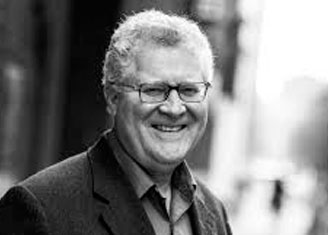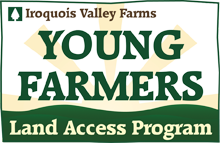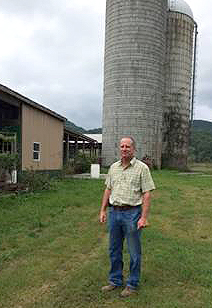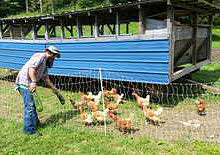
Date: 2025-10-16 Page is: DBtxt003.php txt00009894
Agriculture
Sustainable Farming
Impacting the Next Generation of Sustainable Agriculture: The Evolution of Iroquois Valley Farms
Burgess COMMENTARY
Peter Burgess
Impacting the Next Generation of Sustainable Agriculture: The Evolution of Iroquois Valley Farms

David Miller, CEO and Co-Founder, Iroquois Valley Farms LLC


Impacting the Next Generation of Sustainable Agriculture: The Evolution of Iroquois Valley FarmsIroquois Valley Farms LLC was formed in 2007 to enable the direct investment of capital to support organic farming and healthy food production. Recently the company purchased its 25th farm, a 177 acre pastured dairy in Madison County, N.Y., leased to a young farm family relocating from the Buffalo area. Increasingly, the company is enabling the next generation of farmers to develop sustainable farm businesses that feed a more concerned and engaged consumer. Today millennial tenants account for almost 70 percent of the company’s acres under production. For the most part, these are third generation or more farmers that are carrying forward a family tradition. They are typically farming organically already, selling all their production, and looking to expand their operations.
The primary challenge (and opportunity) of the Iroquois Valley business plan was to build an entity that could indefinitely buy and hold the farmland. Effectively, the tenure of the ownership structure needed to match the generational vision of the farmer. Traditional Wall Street private equity models provided little, if any guidance. In fact, the structural solution was pretty much the antithesis of conventional investment thinking. The new Iroquois Valley model purposely did not offer an exit, and required that capital be committed without a clear view to redemption. The first 100 company investors committed under this operating structure, often using rollover IRAs to invest. It took seven years to hit that investor threshold but it provided a solid foundation on which to grow.
Underlying Iroquois Valley is the land that is being made more productive year by year through regenerative organic farm operations. Our farmers usually start with farmland that is depleted and devoid of the natural fertility that living soils create. They avoid the toxic pesticides and herbicides that are decimating our birds, bees and butterflies. Through varied crop rotations and farm diversity, they build soil and make it better and more valuable. This is how Iroquois Valley defines sustainable investing. To paraphrase a native Iroquois principle, “In all deliberations, one must consider the impact on the Seventh Generation.” As a B Certified Corporation, this social impact is embedded in our Vision Statement.
The very first question that new farmers ask is whether they will have the right to purchase the land someday. If the ownership cannot answer that question with an affirmative, then that entity is merely a trading model. Our tenants earn the option to buy after a seven year vesting. Iroquois Valley has already sold land multiple times to the farmers and has never sold or traded to anyone else. The paramount difference with Iroquois Valley Farms is that the company does not require a land purchase down the road. The farmer can continue to lease. Iroquois Valley is indifferent to the decision because the company was built to hold, supported by a diversified investor base that understands the superior economics associated with this commitment. As Iroquois Valley starts its ninth season, the company has always fostered member unit sales, but not one investor has ever liquidated their entire position.
The company has successfully completed the first two phases of its corporate existence; 1) Restoring the Land/Family Farmer and 2) Transitioning the Investors, and is now beginning its final phase, Regenerating Capital and Scaling the Impact. Members can now request redemption of their equity units, after a seven year hold. Supporting this redemption structure is a growing cash flow, a pool of dedicated real assets, a view to a public offering and liquidity support from a new credit arrangement with RSF Social Finance. Last but not least is the growing number of SRI related financial advisors, foundations, family offices and funds that are putting long term growth oriented clients into the Iroquois Valley debt and equity offerings. As a corporate entity, Iroquois Valley does not charge fees to investors purchasing shares. New members buy directly into the open ended existing portfolio of farms and leases. There is no front/back end fee or carried interest. Iroquois Valley Farms is geared to support the next generation of sustainable farmers, investors and advisors. For more information on our $20,000,000 2015 PPM Offering, please refer to our website at- www.iroquoisvalleyfarms.com
Impacting the Next Generation of Sustainable Agriculture: The Evolution of Iroquois Valley FarmsFarmer Profiles:


Iroquois Valley Farms currently leases to 24 farm families, each with their own farm business and their own farming story. The McMunigal family, one of the newer farm families, produces milk for Organic Valley. Mike and Callie, along with their two children, are returning the 175-acre Mystic River Farm in Monroe County, West Virginia to active use, focusing on pasture-based dairy production. The farm sits near the foothills of the Appalachian mountains, a region of growing interest for new farmers and the company.
Mike and Callie are not “twenty-somethings,” but in mid career. Mike has been a soil conservationist with the West Virginia Conservation Agency, advising dairy and livestock farmers on nutrient/manure management. He has a BS in Biology from Virginia Tech. Callie is a biologist with the US Fish and Wildlife Service and manages the Appalachian Partnership Office connected to the White Sulphur Springs National Fish Hatchery. She works with private landowners in both Virginias to implement habitat restoration projects. Their children, Cade and Maiya, represent the fifth generation of family farming in the area. Maiya particularly loves animals and enjoys helping with the milking chores.
Impacting the Next Generation of Sustainable Agriculture: The Evolution of Iroquois Valley FarmsAnother farm, the Healing Ground farm in Kentucky, is in so many ways a metaphor for what Iroquois Valley Farms is doing for the soil, for healthy food, and for communities. Fred and Michael Lewis, two U.S. veterans, share Iroquois Valley Farms’ vision of returning soil to a naturally healthy and productive state. They farm holistically with organic practices incorporating pastured livestock and diversified vegetable operations on 120 leased acres. They will also be teaching other veterans, through the organization, Growing Warriors (http://growingwarriors.org) that sustainable agriculture does more than heal the soil. Their mission is educating disabled veterans how to run a sustainable farm and be a successful farming entrepreneur.
The Lewis brothers will be pasturing poultry and small livestock while incorporating a diverse array of vegetables and farm to table crops. Production will be targeted locally to nearby schools and through a CSA (Community Supported Agriculture). Returning veterans that have served our country are now serving their local communities and are a powerful voice in this battle to protect our environment and foods.
Article by David Miller, CEO and Co-Founder, Iroquois Valley Farms LLC
Rooted by heritage in Iroquois County, Illinois, Mr. Miller returned to his native farming community in 2005 after a 30 year career in banking and real estate financial management. Purchasing a small 10 acre family farmstead, he re-connected with local relatives farming organically. In 2007 he started Iroquois Valley Farms LLC by connecting a small group of family and friends to a 142 acre farm.
Prior to seeding sustainable farmland ventures, Mr. Miller held executive positions at Bank of America, Santa Fe Southern Pacific and First Chicago Corporation. His extensive experience in structuring alternative real estate investments led to the formation of Iroquois Valley Farms, the first private company in the United States to integrate farmland and organic food production, utilizing mostly mid-size family farmers.
An MBA graduate of Columbia University’s School of Business and 1975 graduate of Loyola University of Chicago, Mr. Miller views education as the primary key to changing the nature and health of our current food production system. In this regard, Mr. Miller is a member of the Advisory Board of the Institute for Environmental Studies at Loyola and was recently honored by the University (Damen Award) for distinguished services in the field of environmental sustainability. He resides nearby in Winnetka, Illinois along with his wife and three children.
Sign up for the GreenMoney Monthly e-Journal